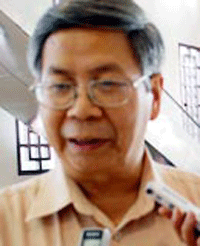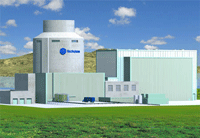 Deputy Dang Vu Minh, Chairman of the National Assembly’s Science-Technology and Environment Committee, told
Deputy Dang Vu Minh, Chairman of the National Assembly’s Science-Technology and Environment Committee, told
 Deputy Dang Vu Minh, Chairman of the National Assembly’s Science-Technology and Environment Committee, told
Deputy Dang Vu Minh, Chairman of the National Assembly’s Science-Technology and Environment Committee, told
VNExpress he’s sure
VNExpress: What are the basic features of the nuclear power project that will be submitted to the National Assembly?
Deputy Dang Vu Minh: It’s planned that our first two nuclear power plants will be built in Phuoc Dinh and Vinh Hai communes in Ninh Phuoc and Ninh Hai districts of Ninh Thuan province beginning in 2015. Each will have a pressurized water reactor able to supply 1000 megawatts to the national grid. The plants will become operational by 2020.
VNE: Some countries that have advanced technology choose to develop clean energy from wind or waves. Why have we chosen nuclear power?
|
It is expected that Minister of Industry and Trade Vu Huy Hoang will present the Ninh Thuan nuclear power project to the National Assembly on November 6. One week later, deputies will discuss this project. On November 25, the NA will vote on the project. |
Minh: Many countries are developing wind, solar and even sea wave energy, forms of renewable energy. But it is estimated that recycled energy can meet only 10 percent of world demand while its production costs are high.
Nuclear power is the most suitable new energy for
VNE: At
Minh: Four factors determine the safety of a nuclear power plant. Firstly, good preparation. According to the experience of other countries, it takes 15 years to finalize a legal regime for the use of nuclear power, learning experience, training personnel and choosing the suitable sites for construction.
The second factor is human resources. A 2000 MW plant needs around 1000 employees. Ten percent of them directly run the nuclear reactor. We need at least five years to train the latter and send them to practice in countries with developed nuclear technology. They have to pass a strict examination to get the certificate to run the reactor.
The third factor is technology. We have to select a technology now that will be still advanced in 2020, when our nuclear power plants become operational.
The fourth factor is management and organization. This requires strict and serious labour rules and disciplines. All workers have to strictly obey technical procedures.
In recent years, we have learned to operate big power plants like the Hoa Binh hydro-power plant, the Pha Lai thermal power plant and the Ca Mau gas-electricity-fertilizer complex. I believe that our experience with these projects is good preparation for more complicated works – the nuclear power plants – in the future.
The Committee has examined and verified these plans. We support the Government’s initiative to build the nuclear power plants in Ninh Thuan province.
VNE: Will
Minh: Beginning in 1959,
In 1975, these experts restarted the research reactor in Da Lat. Since 1984, that reactor has been running safely and effectively.
It is true that we are facing difficulties in human resources for the nuclear industry because many experts of that earlier generation have retired.
We will rely on experts who are good at foreign languages and have professional skills, who will be sent abroad for training;on overseas Vietnamese experts invited to work as consultants; and hiring some experts from international consulting organizations.
I think we have to attach importance to training our own experts. Vietnamese experts will participate in this project from the beginning in 2015 and they will be able to run the plants when construction is finished in 2020.
VNE: The Science and Technology Committee and other agencies have surveyed nuclear power technology in developed country. Which technology is most suitable to
Minh: There are 439 nuclear reactors in 31 countries. I went to
For nuclear piles of 1000 MW, some countries use nearly 1000 workers while other employ only a few over 500. It depends on many factors, such as the kind of technology, the level of automation and management style.
We need to invite good experts help us evaluate each type of technology.

 Previous page
Previous page Back to top
Back to top







